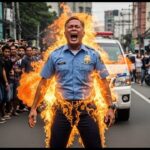What A Shame! Rubina Dilaik 19-Month-Old Twin Daughters Face Racism
.
.
Rubina Dilaik Speaks Out on Colorism Faced by Her Twin Daughters: A Bold Stand Against Beauty Stereotypes
In a world that is rapidly advancing in technology, education, and global awareness, it is heartbreaking to realize that deep-rooted prejudices such as colorism still find space in our daily lives—sometimes even targeting the most innocent among us: children. Recently, beloved Indian television actress Rubina Dilaik, best known for her roles in Shakti – Astitva Ke Ehsaas Ki and her victory in Bigg Boss 14, opened up about an emotional and deeply troubling experience. Her 19-month-old twin daughters, barely past their infancy, have already become victims of color-based discrimination.
This shocking revelation not only sheds light on the persistence of beauty stereotypes in Indian society but also initiates a much-needed conversation around how parents, especially public figures, are challenging these outdated beliefs for the sake of future generations.

Motherhood After Struggles: A Journey Worth Celebrating
Rubina Dilaik’s path to motherhood was not a smooth one. After five years of marriage to fellow actor and singer Abhinav Shukla, Rubina became a mother in 2023, welcoming twin baby girls into her life. Her journey was celebrated by fans who had followed her both on television and social media, where she often shares glimpses of her personal life through vlogs and heartfelt posts.
However, behind the moments of joy and laughter, Rubina has had to face an uncomfortable reality—one that many parents in South Asia can relate to but few speak about openly. Despite the immense happiness her daughters have brought her, she now finds herself in a fight against color-based discrimination that targets even toddlers.
The Painful Reality: When Children Are Not Spared
In a recent vlog, Rubina revealed how people—sometimes even close family members—have made insensitive remarks about the differing skin tones of her daughters. One daughter has a fairer complexion, while the other is dusky. This simple difference has become a subject of comparison and unsolicited advice, reflecting how deeply entrenched colorism is in our societal psyche.
Rubina shared, “My daughters are just 18-19 months old, and already people comment on their skin tone differences. One is fair, and one is dusky. People come and compare them. That’s wrong.”
She emotionally expressed her disappointment, stating that while she can shield her children from such toxic views inside her home, it’s impossible to control what others say in public or on social media. Her words highlight an ugly truth—colorism doesn’t wait for adulthood to cast its shadow. Even babies are not spared.
A Mother’s Stand Against Beauty Stereotypes
What makes Rubina’s response so powerful is her refusal to conform to societal pressure. She revealed that some individuals had even suggested applying fairness-enhancing products or natural remedies on her dusky daughter to “lighten her skin.” Rubina’s reply? A firm and dignified rejection.
“Why should I do that?” she asks. “Both my daughters are beautiful. It took me over 30 years to understand that beauty standards are man-made and harmful. No one should set these standards for my daughters.”
This statement is a breath of fresh air in a society where fairness creams still dominate advertisements, and matrimonial columns continue to describe ideal brides as “fair and beautiful.” Rubina’s approach is rooted in acceptance, love, and awareness—qualities that every parent must adopt if the cycle of discrimination is to be broken.
Colorism in India: A Deeply Rooted Issue
Colorism, or prejudice against individuals with a darker skin tone, has long been a societal challenge in India and other parts of South Asia. While it is often associated with colonial hangovers and Eurocentric beauty ideals, the issue runs much deeper, affecting opportunities in education, marriage, employment, and, as Rubina’s experience shows, even basic respect.
From film industries glorifying fair-skinned actresses to advertisements pushing “fairness” as a key to success, colorism is subtly and sometimes blatantly perpetuated in the media. Children grow up seeing these messages and internalizing them, which can lead to harmful self-esteem issues and a distorted perception of beauty.
Rubina’s stance as a mother and celebrity is crucial because it sets an example for countless families who might be silently enduring the same discrimination. By choosing not to tolerate such comments and speaking out, she empowers other parents to stand up for their children as well.
Raising Children Away from Toxic Norms
To further protect her daughters, Rubina has made a significant lifestyle decision. She has chosen to raise her daughters in her hometown Shimla, away from the hustle and pollution of Mumbai. There, surrounded by nature and simplicity, Rubina hopes to offer her children a healthier and more emotionally supportive upbringing.
She said, “I want to raise my daughters in clean air, in the soil of the village, away from pollution and toxicity—both environmental and societal.” This decision was not just about physical health but also emotional well-being. Shimla, with its scenic beauty and slower pace, provides a more nurturing environment than the often judgmental and invasive atmosphere of a big city.
Rubina returns to Mumbai during the monsoon, but her base remains Shimla, reflecting her commitment to shielding her children from unnecessary social pressures during their formative years.
The Power of Representation and Social Media
Rubina Dilaik has over the years built a strong presence on social media, where she engages with millions of fans. Her choice to speak openly about such a sensitive topic as colorism has had a positive ripple effect. Many fans and followers have praised her for addressing the issue head-on and for using her platform to spark meaningful dialogue.
In a digital world where influencers often only showcase the filtered, glamorous side of life, Rubina’s honesty stands out. She uses her vlog not just for updates but to reflect on parenting challenges, emotional growth, and social responsibility.
Her courage in addressing colorism in such a personal way is commendable, and it has inspired many others to come forward with similar experiences.
Creating a Future Beyond Fairness
What Rubina’s story teaches us is that fighting discrimination starts at home. When parents challenge biased remarks, when they refuse to let societal expectations dictate their children’s worth, they are planting seeds for a more inclusive future.
Color should never define a child’s value. Beauty should never be measured in shades. And comparison should never come at the cost of confidence. Rubina Dilaik, through her strength and love, is showing the world what real beauty looks like—unapologetic, accepting, and fearless.
Conclusion: Let This Be the Start of Change
Rubina’s experience is a powerful reminder that while change begins with awareness, it solidifies through action. Speaking out against colorism, choosing love over judgment, and raising children in an environment of equality are not just parental choices—they are acts of resistance.
As fans and citizens of a world that claims to be modern and inclusive, we must ask ourselves: Are we perpetuating harmful ideals, even unconsciously? Are we willing to listen, unlearn, and grow?
Rubina Dilaik is doing her part. Now it’s up to us to do ours.
News
“तलाकशुदा पत्नी ने झूठे केस में “अपने ही पति को जेल भिजवा दिया… “फिर जो हुआ…
“तलाकशुदा पत्नी ने झूठे केस में “अपने ही पति को जेल भिजवा दिया… “फिर जो हुआ… कहते हैं हर चमकती…
जिसे सब सफाई कर्मचारी समझ रहे थे, वो निकला करोड़ों की कंपनी का मालिक! क्या…
जिसे सब सफाई कर्मचारी समझ रहे थे, वो निकला करोड़ों की कंपनी का मालिक! क्या… दानिश रायजादा, एक ऐसा नाम…
Flight में अरबपति की बच्ची रो रही थी, फिर गरीब लड़के ने जो किया – देखकर सब हैरान रह गए।
Flight में अरबपति की बच्ची रो रही थी, फिर गरीब लड़के ने जो किया – देखकर सब हैरान रह गए।…
30 डॉक्टर फेल हो गए, लेकिन एक गरीब लड़की ने करोड़पति की जान बचा ली!”
30 डॉक्टर फेल हो गए, लेकिन एक गरीब लड़की ने करोड़पति की जान बचा ली!” रात का वक्त था। मुंबई…
Tiger 3 Movie Actor Varinder Singh Ghuman Passed Away| Varinder Singh Ghuman Antim Sanskar
Tiger 3 Movie Actor Varinder Singh Ghuman Passed Away| Varinder Singh Ghuman Antim Sanskar . . Tiger 3 Actor Varinder…
Abhishek celebrated Karwa Chauth with his wife Aishwarya Rai and Shweta Bachchan, Amitabh Jaya also
Abhishek celebrated Karwa Chauth with his wife Aishwarya Rai and Shweta Bachchan, Amitabh Jaya also . . Abhishek Bachchan Celebrates…
End of content
No more pages to load





